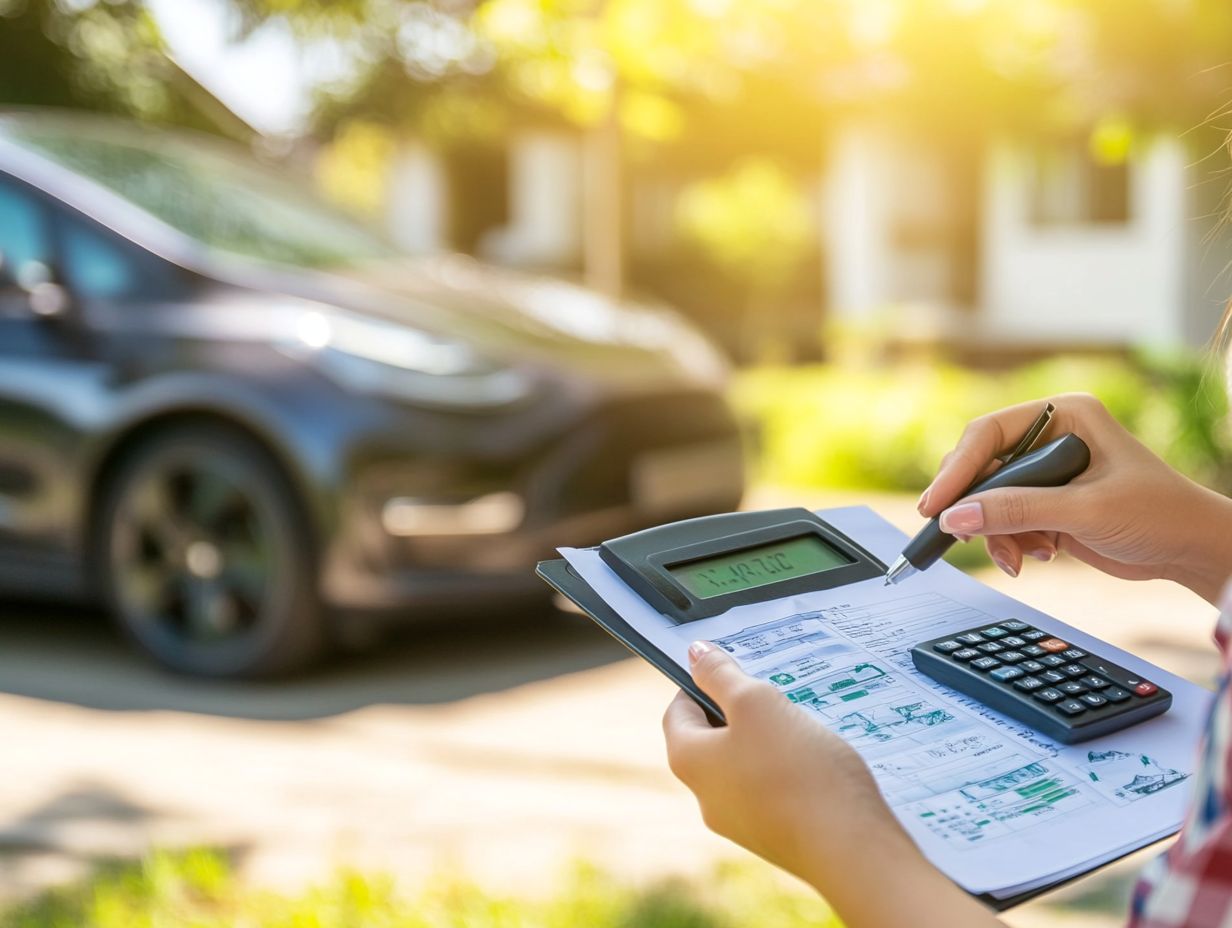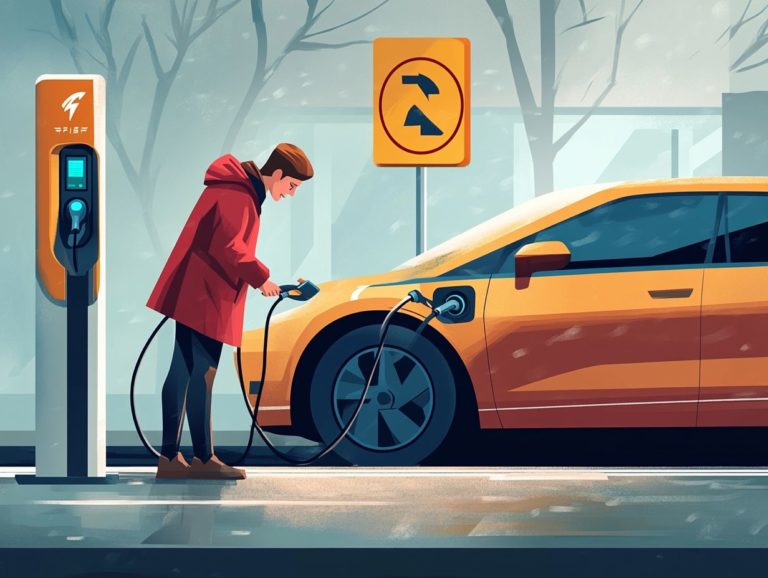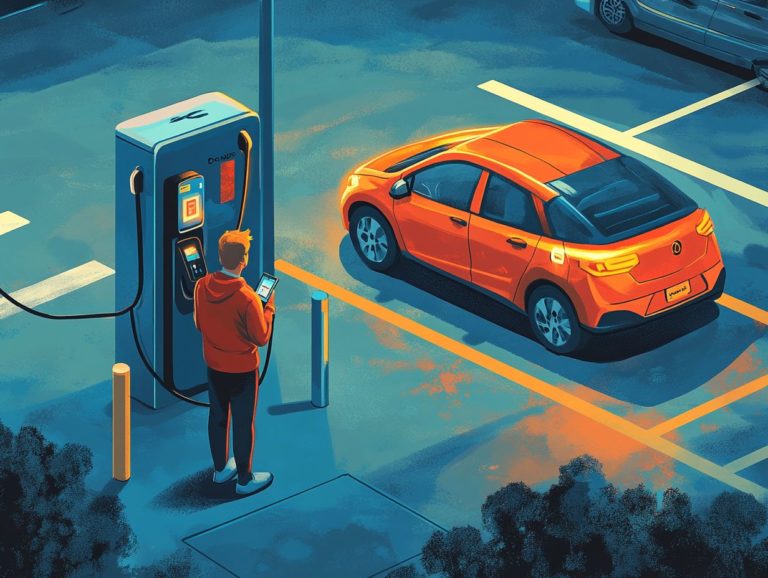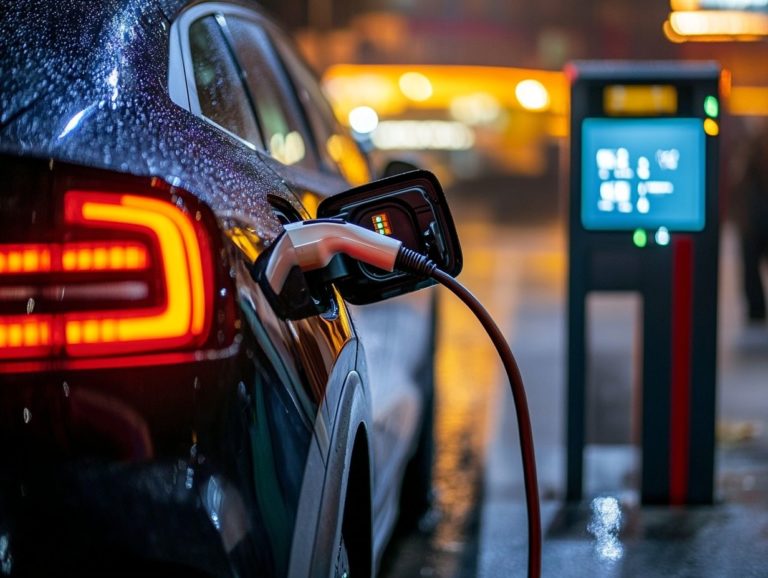What Are the Tax Incentives for EV Buyers?
As electric vehicles (EVs) become increasingly popular, understanding the financial advantages that come with your purchase is essential.
This article explores the various tax incentives available, starting with federal tax credits and the eligibility criteria you need to meet.
It also looks into state and local incentives, showcasing what different regions offer.
Beyond just incentives, the article highlights the broader benefits of owning an EV, such as lower maintenance costs and the positive impact on the environment.
You ll find valuable tips to maximize these incentives, ensuring you make the most of your investment.
Contents
Key Takeaways:

- Federal Tax Credits: Can reduce the cost of your EV significantly.
- State and Local Incentives: Vary by location and could include rebates or tax exemptions.
- Owning an EV: Saves on maintenance and benefits the environment.
Explanation of Tax Incentives for EV Buyers
Understanding tax incentives for electric vehicle (EV) buyers is crucial for maximizing your savings. The U.S. government, through the IRS and the Inflation Reduction Act, offers substantial tax credits and incentives for both new and used clean vehicles, encouraging the switch to greener alternatives.
You can enjoy credits based on factors like battery capacity and your vehicle identification number, while keeping an eye on the income limits and eligibility criteria established by IRS regulations.
Federal Tax Credits for EVs
Federal tax credits for electric vehicles (EVs) can significantly lower the initial costs of acquiring both new and used clean vehicles. These credits encourage environmentally conscious decisions.
Regulated by IRS guidelines, these credits fluctuate based on various factors, including the vehicle manufacturer and its suggested retail price. You can claim credits based on the vehicle’s battery capacity and your modified Adjusted Gross Income (AGI) (the amount of your income after deductions), with specific regulations determining your eligibility.
Eligibility Requirements and How to Claim
To claim the EV tax credit, meet specific eligibility requirements set by the IRS to ensure that the vehicles you purchase qualify for the benefits. This involves adhering to guidelines regarding the type of electric vehicle, whether it s a plug-in EV or a fuel cell vehicle. Just complete Form 8936 and refer to Publication 5866 for guidance on vehicle eligibility criteria.
Gather essential information about the vehicle, including its make, model, year, and vehicle identification number (VIN). It’s vital to ensure that the vehicle is purchased new, as this can significantly impact your eligibility.
Once you ve completed the necessary forms, keep supporting documentation handy, such as receipts and proof of purchase, to back up your claim should the IRS request it. Consult a tax professional for assistance in navigating any changes in tax laws.
State and Local Incentives for EVs

In addition to federal tax credits, state and local incentives play a vital role in promoting the adoption of electric vehicles (EVs) throughout the U.S. These incentives provide you with even more financial advantages.
For instance, California’s Clean Vehicle Rebate Project offers tailored rebates and incentives for residents, making the transition to clean vehicles both accessible and appealing.
Grasping the nuances of these incentives is essential for maximizing the benefits of EV ownership.
Ready to save money and help the planet? Start exploring your EV options today!
Overview of Incentives by State
The landscape of state and local incentives for electric vehicles (EVs) is diverse across North America. Various jurisdictions roll out unique programs to promote clean energy. These incentives come in many forms such as tax credits, rebates, and grants designed specifically for electric vehicle buyers all aimed at making EV ownership more affordable. As states increasingly embrace sustainability, understanding these incentives is essential for maximizing your savings.
Take California, for example. It boasts one of the most generous rebate programs, offering up to $7,000 for qualifying EV purchases. Meanwhile, New York has its Drive Clean Rebate program, providing rebates of up to $2,000 to entice buyers.
Some states have even introduced income-based incentives to broaden access to electric vehicle ownership. This not only eases the financial burden for potential buyers but also aligns with national goals to reduce greenhouse gas emissions. These incentives are crucial in a larger strategy to transition toward renewable energy, contributing to a cleaner environment while simultaneously boosting local economies.
Other Benefits of Owning an EV
Owning an electric vehicle (EV) offers more than just tax incentives; it unlocks a host of advantages that elevate your driving experience.
You will enjoy reduced maintenance costs, which is a bonus for your wallet. Plus, consider the significant positive environmental impact. By driving a clean vehicle, you help create lower emissions, making a tangible difference.
This transition to EVs not only enhances your personal savings through decreased upkeep but also supports clean energy initiatives, paving the way for a healthier planet for future generations.
Reduced Maintenance Costs and Environmental Impact
Electric vehicles stand out for their significantly reduced maintenance costs compared to traditional gas-powered cars. With fewer moving parts and no need for oil changes, you enjoy substantial savings over time while positively impacting the environment. By using clean energy sources, you help promote cleaner air and reduce carbon footprints.
The lower routine upkeep costs mean electric vehicle owners typically face fewer repair expenses, thanks to the simplicity and reliability of electric drivetrains, which are systems that power electric cars without traditional engines. Over the lifespan of your vehicle, these savings can add up significantly, allowing you to invest in other essential areas, such as education or home improvements.
As more drivers embrace electric models, the collective reduction in greenhouse gas emissions becomes crucial in the fight against climate change. Together, we can create a vibrant, healthier planet for generations to come, highlighting the vital importance of widespread electric vehicle adoption in advancing sustainability.
Maximizing Tax Incentives for EV Buyers

Act now to maximize your tax incentives and save big on your electric vehicle purchase! A strategic approach to the buying process is essential to ensure you comply with IRS regulations to qualify for available credits.
By understanding the intricacies of the EV tax credit and familiarizing yourself with eligibility requirements, you can make informed decisions that not only enhance your savings but also support clean energy initiatives.
Explore your local incentives and consider making the switch to an electric vehicle today!
Tips for Making the Most of Available Incentives
To fully make the most of the incentives for electric vehicles, familiarize yourself with a variety of programs, including federal tax credits and state incentives. Understanding specific details such as vehicle identification numbers (VIN), income limits, and which clean vehicles are eligible is crucial to maximizing the benefits these programs offer.
As an aspiring electric vehicle owner, researching the eligibility requirements set forth by the IRS and local governments can be immensely beneficial. Gathering essential documentation like proof of purchase and income verification is key to streamlining your application process.
Keep an eye on deadlines to ensure your applications are submitted promptly. Engaging with knowledgeable dealerships can provide you with further clarity and assistance regarding these programs.
Stay updated on changes in rules to maximize your savings! Being informed about any changes in regulations or new incentives can significantly enhance your financial advantages when purchasing an electric vehicle.
Start your journey to owning an electric vehicle today!
Watch this video to learn how to maximize your EV incentives!
Common Questions About EV Incentives
What are the tax incentives for EV buyers?
The tax incentives for EV buyers vary depending on the country or state they reside in. Common incentives include tax credits, exemptions, and rebates.
What is a tax credit?

A tax credit is an amount of money that can be deducted from the total amount of taxes owed. In the context of EVs, it is a credit given to the buyer as an incentive for purchasing an electric vehicle.
Are there any tax exemptions for EV buyers?
Yes, some countries or states offer tax exemptions for EV buyers. This means that EVs may not be subject to certain taxes, such as sales tax or vehicle registration fees.
How do I claim my tax incentives for purchasing an EV?
The process for claiming tax incentives for EV purchases varies depending on the country or state. Generally, you will need to provide proof of purchase and fill out the necessary forms to receive the incentive.
Are there any other incentives for EV buyers besides tax incentives?
Yes, some countries or states may offer additional incentives for EV buyers, such as free charging stations or discounts on toll fees. It is important to research what other incentives may be available in your area.
Do all EVs qualify for tax incentives?
No, not all EVs will qualify for tax incentives. Some countries or states may have certain requirements, such as minimum battery size or vehicle price, for an EV to be eligible for incentives. It is important to check the specific requirements in your area.






